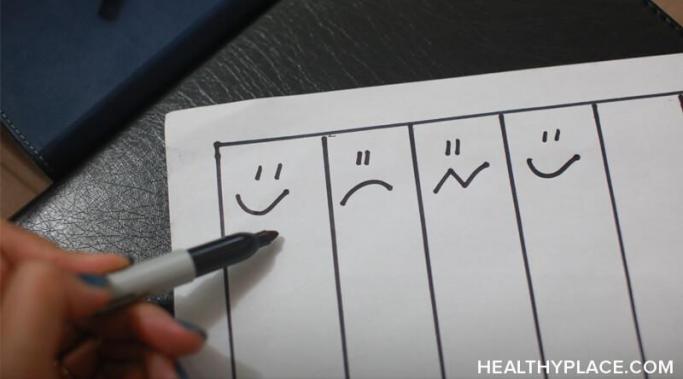When you lose hope because of bipolar depression life will feel impossible. I know this impossible feeling all too well. I know what losing hope feels like all too well. But I also know what surviving it feels like. Here's my message for when bipolar depression makes you lose hope.
Breaking Bipolar
Bipolar doesn't make you unworthy of love. I have a lot of trouble with that statement. I don't have trouble because I don't believe it -- I do -- I have trouble because I don't feel lit. I'm not sure whether I feel like life has taught me that I'm unworthy of love because of bipolar or my brain just made up that nastiness because of the depression, all I know is that it feels true. It feels like I'm unworthy of love because of bipolar.
Quality of life in bipolar disorder varies depending on the type of mood episode being experienced. As a reminder, moods in bipolar disorder can be depressed (a severely low mood), manic (a highly elevated, energetic mood), hypomanic (a less-heightened version of mania), mixed (with manic/hypomania and depressed symptoms occurring at the same time) or euthymic (when no diagnosable mood episode is present; you might think of it as "normal"). Bipolar disorder is considered a cyclical disorder and euthymia is what happens between mood episodes; and quality of life in euthymia in bipolar disorder is important -- after all, it's our "normal" mood. It's what we're striving for. It's our version of remission. So what is the quality of life in bipolar disorder like in euthymic periods?
In bipolar disorder, stress is a problem. This is not to suggest that stress can't be a problem for anyone, but stress can actually worsen the symptoms of bipolar disorder and decrease stability so it's something we with bipolar really have to be concerned about. Read about how stress feels in bipolar disorder and what you can do about it.
Sometimes you can't see a future with bipolar disorder. I get this. I really do. I have looked into the future with bipolar and it has felt like looking into an endless, black well. But recently, it occurred to me that you can see a future with bipolar disorder, and that future doesn't have to look completely bleak.
Do you want to help a depressed friend or family member this holiday season? Many people do. Depression touches so many that it's almost a given you will know someone who struggles with it (or you, yourself, will) at some point. But many people don't know what to do to help a person with depression over the holidays. Here are some tips to consider.
Bipolar can wreck your work life. It's just a fact. It can. If you've ever had a severe episode of depression or mania/hypomania, you know this. But what do you do when bipolar disorder wrecks your work life. Here are a few ideas.
Today I'd like to say what I'm not thankful for: I'm not thankful for bipolar disorder. Now that Thanksgiving is over, and people have said what they are thankful for, I want to focus on this for a minute. This isn't meant to be negative but, rather, simply a fact. While I know some feel differently, for me, bipolar disorder is something I'm just not thankful for.
Anger can affect bipolar disorder. In fact, the relationship between anger and bipolar disorder is bidirectional: bipolar disorder can affect anger and anger can affect bipolar disorder. As a person with bipolar disorder, I find anger and its effects scary.
Bipolar treatment changes are often brutal, as anyone who has gone through them knows. And in my case, there always seems to be some kind of change going on either to deal with a new symptom or mitigate a side effect. And while there are algorithms for treating bipolar disorder, no algorithm takes a patient through a 20-year course of the illness that doesn't respond well to medication. No algorithm outlines the cocktails the likes of which I, and many others, take. This means that doctors are using their clinical judgment and experience rather than empirical evidence to make treatment decisions. In other words, they're guessing. Don't get me wrong, they're guessing intelligently, to the best of their ability, but guessing really is what's happening with many bipolar treatment changes.









